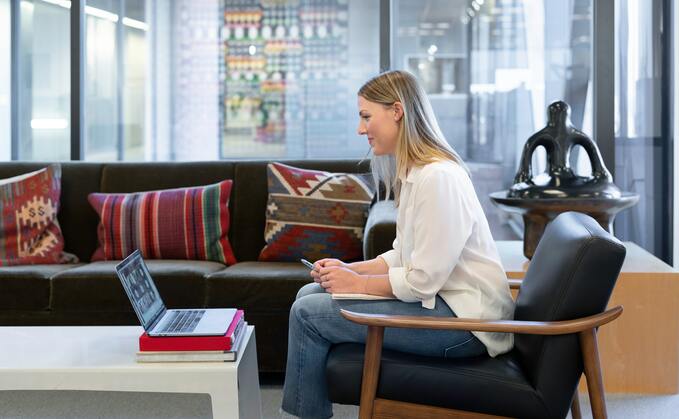
Increasing use of digital tools means that advisers have more options at their disposal than ever before, but how will this determine the way in which advisers engage and build trust with their clients?
One of the main effects of increased digitalisation in protection, in conjunction with the Covid-19 pandemic, has been to force advisers to reconsider the best way in which to engage with their clients.
Whereas many advisers would have previously relied solely on face-to-face meetings or telephone calls to speak with those seeking cover, virtual meetings on Zoom and Teams changed the game last year and provided another touchpoint under exceptionally restrictive circumstances.
Now that lockdown measures have been fully dropped and the country aims to return to pre-pandemic working conditions, advisers must ensure they are offering an array of communication options for clients. But what does this mean for the future of client engagement and will face-to-face meetings become a thing of the past?
"We've always given clients the choice of interacting primarily digitally or on the phone," says Alan Knowles, managing director of Cura Financial Services. "This works well for us and our clients, and we do see more clients asking for it now than in the past. Where clients interact digitally, we will always need more information than what is provided, but it gives them a chance to provide the bulk of the information without speaking to an adviser.
"We have added video meetings into the client journey at Cura, but for us it's all about client choice. Phone, video call or primarily digital is fine, as long as it suits the client and, in my opinion, this isn't a 'one size fits all', it's about providing the most suitable route per individual client."
Digital vs. Face-to-Face
Research from Zurich published at the end of July found that around two thirds of advisers had returned to face-to-face client meetings, following the removal of social distancing restrictions, with a similar number planning to resume in-person meetings with their providers.
While face-to-face meetings and telephone calls continute to play an important role in protection conversations, the rise of virtual meeting spaces, such as those provided by Zoom, have proved invaluable throughout the pandemic and are likely to become a staple option for advisers going forward.
"I think online platforms are a vital tool to help create awareness about the importance of insurance and also an aid to help make the product more relatable - especially when using video format," says Karla Edwards, financial adviser and owner of The Protection Parent.
On the flipside, London Money mortgage and protection adviser, Jiten Varsani, says that he is "a bit old fashioned" and prefers to continue face-to-face meetings with clients when discussing what he calls "some of the biggest financial decisions they will make in their lifetime."
"Ours is a very relationship-based industry and thus I feel online meetings do not allow me to build the same rapport with a client as I could face-to-face," he explains. "I hope to continue engaging with clients in this way as it suits me, and for the most part, my client bank. I do feel these physical meetings enhance the boutique style service I aim to offer which results in returning clients and growth via personal recommendation.
"From experience I find there can be too many distractions including poor internet connection and background noises. Within the four walls of a room, there is nothing quite like being able to look into a client's eyes when discussing their finances."
While deployment of virtual meeting platforms are a straightforward practise, adapting these tools into the everyday work of advisers is another matter, explains Rebekah Johnston, head of training and development at Umbrella Protect.
"We used this challenge to develop our staff by promoting zoom calls, Microsoft teams and using online tools to be able still to deliver the best advice possible and still giving our clients optimum service," Johnston says.
"Developing our staff throughout the pandemic has allowed us to have another string to our bow - that can allow us to continue to engage with a wider audience from the whole of the UK and be able to deliver excellent service whether its face to face or remotely."
Building trust
One of the key elements of the adviser-client relationship is trust. Purchasing protection, or even just discussing it for some, can be a sensitive and delicate matter for advisers to navigate, particularly if it involves complex medical histories, mental health issues or other highly personal information.
As such, clients will expect to be able to use the communication channels that are most suitable for them, not the adviser, in order to develop a mutual trust between the two parties.
"Trust can be built over the phone, Zoom or face-to-face - it's the habit that needs to be broken," says Edwards. "Before Covid-19 I would travel two hours for an appointment because I was so adamant that I could not build the same rapport over the telephone. I have since been proven wrong; it's our own beliefs that are restricting the potential for a much slicker, clear and convenient relationship built through technology."
Cura's Knowles says that it should be more about the adviser as a person than the method of communication that allows a client to develop a level of trust with them, and Umbrella Protect's Johnston states that trust goes beyond just the platform to the actions of the adviser.
"Building trust with a client comes in different ways. This can be calling when you say you will, sending an email when you have said you will and doing what you say you are going to," she says.
"When meeting clients remotely or face-to-face we are always selling ourselves; by using our compliance documentation we cement the trust factor at every appointment. At Umbrella Protect we talk about talking to clients with a smile in our voice - this can make someone feel at ease."
Personal flexibility
Even with his preference for maintaining face-to-face meetings with clients, London Money's Varsani says he is still happy to engage with clients digitally if that is what suits them and that it's important to recognise that individual advisers will have their own preferences and strengths in different areas.
"The decision of digital vs physical will vary based on adviser bias, business model, client preference, complexity of advice, geographical locations, sensitive nature of disclosures, etc," he explains. "Providing that at its core the advice is solid and that both the client and adviser feel digital engagement works for them, I see nothing wrong with this."
It's a sentiment that is echoed by Reassured's director of corporate strategy, Phil Jeynes, who details that despite the life insurance broker having previously conducted their advice via the phone, the pandemic has shown that technology exists to offer remote meetings that retain an element of the face-to-face experience.
"I think we'll see increasing take up where it's offered," he says. "Conversely, many customers don't want a video call - they want to buy from us in the convenience of their home, without the pressure many feel to be groomed and dressed ‘appropriately!' As always, the smart intermediary will offer flexibility and choice."
Advisers will also need to keep in mind that there will be clients that, for whatever reason, are unable to use digital tools, such as those without access to laptops or internet, while other vulnerable clients may struggle to use the tools altogether.
In this sense, being flexible enough to respond to individual client requirements and offer the right option will continue to be a key part of an adviser's skillset, particularly as the range of platforms increase, whether that be in-person, on the phone or on a digital platform. This is what the new normal of protection advice looks like.













